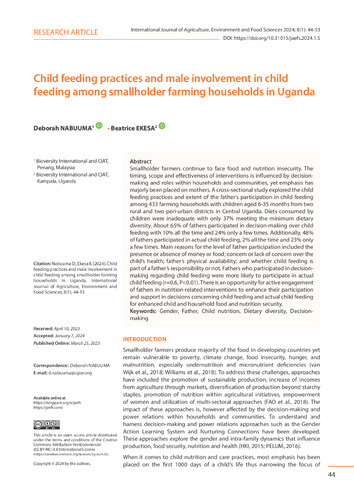Child feeding practices and male involvement in child feeding among smallholder farming households in Uganda
Smallholder farmers continue to face food and nutrition insecurity. The timing, scope and effectiveness of interventions is influenced by decision-making and roles within households and communities, yet emphasis has majorly been placed on mothers. A cross-sectional study explored the child feeding practices and extent of the father’s participation in child feeding among 433 farming households with children aged 6-35 months from two rural and two peri-urban districts in Central Uganda. Diets consumed by children were inadequate with only 37% meeting the minimum dietary diversity. About 65% of fathers participated in decision-making over child feeding with 10% all the time and 24% only a few times. Additionally, 48% of fathers participated in actual child feeding, 2% all the time and 23% only a few times. Main reasons for the level of father participation included the presence or absence of money or food; concern or lack of concern over the child’s health; father’s physical availability; and whether child feeding is part of a father’s responsibility or not. Fathers who participated in decision-making regarding child feeding were more likely to participate in actual child feeding (r=0.6, P<0.01). There is an opportunity for active engagement of fathers in nutrition-related interventions to enhance their participation and support in decisions concerning child feeding and actual child feeding for enhanced child and household food and nutrition security.

